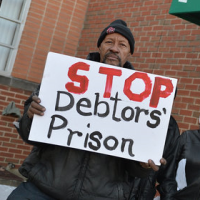13 Missouri Cities Accused of Putting African Americans into Debtors' Prisons
 (photo: Michael B. Thomas via Getty Images)
(photo: Michael B. Thomas via Getty Images)
By Joe Harris, Courthouse News Service
ST. LOUIS (CN) — A federal class action (pdf) accuses 13 St. Louis County cities of putting black people in de facto debtors' prisons because they can't afford to pay traffic tickets and fines for other petty offenses.
Quinton Thomas and 12 other named plaintiffs sued St. Ann, Edmundson, Normandy, Cool Valley, Velda City, Beverly Hills, Pagedale, Calverton Park, St. John, Bel-Ridge, Wellston, Velda Village Hills and Bellefontaine Neighbors. All are in north St. Louis County.
"In 2015 alone, the defendant municipalities issued an average of 1.7 arrest warrants per household and one (1) arrest warrant for every adult, mostly for allegedly unpaid debt in connection with tickets supposedly involving traffic violations and other petty offenses," the complaint states.
The plaintiffs say they were "locked in a cage" solely because they couldn't afford cash payment for minor violations.
"And each was left to languish in filthy, often overcrowded jail cells because he or she could not afford to pay the jacked-up fines, penalties, and other charges that defendants assessed," the complaint states. "Defendants did not inquire about, much less accommodate, the hardships their extortionate demands placed on plaintiffs and their families. Nor did defendants offer to provide plaintiffs with counsel who could advise them of their rights or otherwise protect them from defendants' predatory scheme."
The lawsuit mirrors a class action filed in February 2015 against nearby Ferguson and Jennings. Those class actions spurred reforms in those cities' courts.
The Ferguson and Jennings class actions were filed by an attorney with Equal Justice Under Law, in Washington, D.C., in conjunction with St. Louis-based ArchCity Defenders, a nonprofit, and by St. Louis University School of Law. This latest class action was filed by Thomas Harvey with ArchCity Defenders.
All the class actions stem from the protests after Michael Brown's death. Brown, an unarmed black man, was shot by Ferguson police officer Darren Wilson, who is white, on Aug. 9, 2014. Protesters voiced concerns about policing in black communities and the cities using the court system as a revenue generator on the backs of poor black people.
The latest class action says this "extraordinary abuse of government authority" starts with the over-policing of poor black communities, which causes excessive citations for traffic and other municipal violations.
The citations are followed by "arbitrary fines, penalties, surcharges, and interest charges that pile up like debts to a loan-shark, arrest warrants auto-generated without good cause or even a semblance of due process, and imprisonment — imposed without assistance of counsel — in squalid debtors' prisons," the complaint states.
The plaintiffs claim the system disproportionately targets blacks, places their jobs at risk and leaves their children without supervision.
They seek unspecified damages and an injunction.
To Learn More:
Quinton M. Thomas, et al., v. City of St. Ann, et al. (U.S. District Court, Eastern District of Missouri) (pdf)
Judge Behind Louisiana “Debtor’s Prison” Agrees to 75-Day Break from Harsh Rulings against Poor Defendants (Associated Press)
ACLU Sues Biloxi, Mississippi, over Debtors’ Prison (by Steve Straehley, AllGov)
Debtors’ Prisons may be Illegal, but they still Exist in Texas and Washington (by Noel Brinkerhoff, AllGov)
Stealth Return of Debtors’ Prison in Ohio (by Noel Brinkerhoff, AllGov)
Supreme Court Takes a Step Closer to Debtors’ Prison (by Noel Brinkerhoff, AllGov)
- Top Stories
- Unusual News
- Where is the Money Going?
- Controversies
- U.S. and the World
- Appointments and Resignations
- Latest News
- Trump Orders ICE and Border Patrol to Kill More Protestors
- Trump Renames National Football League National Trump League
- Trump to Stop Deportations If…
- Trump Denounces World Series
- What If China Invaded the United States?






Comments